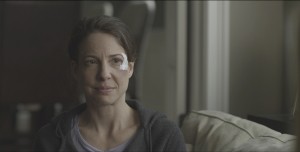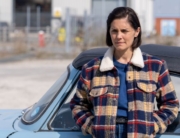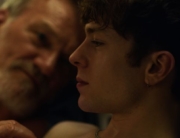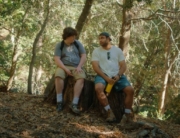
Michael Cera in CRYSTAL FAIRY (Sofa Subercaseaux)
Blue skies ruled the week in Park City this year, where an unfathomable crowd once again flocked to the little resort town in search of distribution deals, corporate swag, networking opportunities, and as many exciting movie experiences as they could find. Those in search of deals were reportedly not disappointed. This was a banner year for sales (Fox Searchlight acquired The Way Way Back for about $10 million). Likewise, it was a good year for name directors. Head of programming Trevor Groth packed this year’s lineup with films by the likes of Jane Campion, Richard Linklater, David Gordon Green, Pablo Larraín, and Michael Winterbottom.
Opening night started with a bang. While in Santiago waiting for financing for Magic Magic (a selection in the fesitval’s Midnight secton), the prolific Sebastián Silva headed to the beach with star Michael Cera and his three brothers, and in 14 days shot Crystal Fairy, an unscripted passion project based on Silva’s own experience of a mescaline trip in his youth. It’s a surprising and touching little story about an unredeemable selfish jerk, played by Cera, who induces his friends to travel to the beach to experience the hallucinatory effects of San Pedro cactus. On the way they pick up another wandering American, a free-love gypsy wannabe who calls herself Crystal Fairy (Gaby Hoffman, in a breakout role). Her brand of unequivocal worldlove clashes, but eventually she infects Cera’s amazingly well-played cad in this remarkably simple yet effective film.
Another favorite, also largely improvised, is Andrew Bujalski’s Computer Chess, a mockumentary in the style of The Office, only set in 1982 at a computer chess programmer’s convention and shot on an actual vintage Portapack camera. “I’ve been accused of working without a script before,” Bujalski said, “And this time it’s actually true.” The casting is spot-on in this hilarious and insightful portrait of a band of ostensible nerds and their individual passions and personal philosophies. Artificial intelligence may be the most consistent topic of discussion throughout the convention, yet it’s the emotional intelligence (or lack of it) that’s largely on display as the (mostly) men compete over a three-day weekend to pit their own program against a human chess master. Keep your eye out for a pretty memorable cast, which includes a host of unconventional choices, including The Waking Life’s Wiley Wiggins and animator Bob Sabiston.
What to Watch For: I was mostly impressed with Nigerian-born and U.S.-based director Andrew Dosunmu’s Mother of George, a portrait of an immigrant husband and wife (Isaach de Bankolé and Danai Gurira) living in Brooklyn and trying their best to give his opinionated mother a grandchild. The costume design, sound design, and cinematography are without question some of the best of the festival. Stark and bold, the film is a visceral trip through an otherwise underrepresented part of the city. It’s a kind of a Greek tragedy. Dosunmu’s actors render exaggerated and highly emotional depictions of struggling but proud working-class folks, who attempt to negotiate traditions and their place in American culture.
Also see another film by Cinematography Award winner Bradford Young (who won the same honor in 2011 for Pariah) entitled Ain’t Them Bodies Saints. Writer/director David Lowery, a serious young talent, is on the hot list. Starring Rooney Mara and Casey Affleck—both brilliant—ATBS is a tragic romance set in the timeless American South, and directed in the lyric and contemplative style of Terrence Malick. It’s a film to think about afterward as much as during. Affleck’s Bob Muldoon, serving time for a murder that his young wife may or may not have committed in the mayhem following a bank robbery, breaks free in search of the daughter he’s never met. It’s an often melancholy and resonant piece about the passions within us and the acts we carry out to satisfy them.
Narco Cultura, for my money, was the documentary to see. As the body count rises in the border town of Juárez, Mexico, due to the mounting drug cartels’ turf war, a popular music and fashion culture has risen around it. Pop music groups, called narcocorridos, have gained huge popularity singing about the exploits of narcos, the murderous and extortionist hoodlums that are currently at war with the Mexican federal police. Director Shaul Schwarz takes us on an all-access journey into the lives of both the singers and the federal agents, who follow behind and clean up the bodies. Another powerful doc is After Tiller, about the handful of doctors in this country practicing late-term abortions. Named for the slain pioneer abortionist George Tiller, it’s a humanizing and affecting portrait of the small group. It follows their particular stories, always with the specter of murder rearing its head.

Robin Weigert in CONCUSSION (David Kruta)
Concussion is a funny and engaging drama about a middle-aged lesbian partner in Long Island, played by a talented Robin Weigert (expect to see more of her), who becomes unhappy in her marriage and begins working as a high priced prostitute, taking only hand-picked female clients. The prostitution feels like a device, a mere setup for a series of affairs, but Concussion is a movie much less about the sex industry than about a woman’s experimentation with infidelity. For first-time feature director Stacie Passon, it’s an accomplishment—a smart and responsible depiction of normalized gay life in this country. Also, it’s refreshing to see a film from such a unique perspective, considering the plethora of male fantasy films that debut weekly. Weigert’s Abby could be any spouse in any relationship losing steam, just looking for a way to meet her needs.
It’s one of a large group of Sundance films this year about sexuality. In Eliza Hittman’s It Felt Like Love, we meet a girl in her mid-teens, Lila (debut actress Gina Piersanti). She follows around a girlfriend, one or two years her senior, learning in tiny snippets the joys and pitfalls of dating and sex. It’s such a delicate film, balancing Lila’s childhood innocence on a precipice out in Gravesend, Brooklyn. We are terrified that, at any moment, Lila might be hurt. Yet at the same time, we’re curious just how far one of the chauvinistic neighborhood boys might push her, emotionally and, yes, physically.

Jonathan Groff, left, and Dennis O’Hare in C.O.G. (Jas Shelton)
Kyle Patrick Alvarez returns to Sundance with his second feature, C.O.G., based on an essay by funnyman David Sedaris—another sly film centered on a gay character. We early on identify so much with Samuel (TV’s Jonathan Groff) that it’s never much of a leap when his sexuality becomes a point of contention. On a self-imposed sojourn in rural central Oregon, Samuel attempts to reconnect with the land by working a series of manual labor jobs. A Yale-educated intellectual, and kind of a dandy, he is a perfect misfit. Along the way, he does indeed learn hard, but always funny, lessons about religious tolerance and selfish behavior. Denis O’Hare is the standout here, as a bible-thumping recovering alcoholic whose temper usually gets the best of him, despite his consistent efforts to restrain himself.
Apart from Silva’s two installments, watch for an additional great Chilean film, Pablo Larraín’s No, another experiment shot on an antiquated camera format, starring Gael García Bernal as a young advertiser hired to develop a campaign to sway an upcoming referendum against the notorious 1970’s dictator Pinochet. It’s both funny and packed with tension as the advertisers-cum-revolutionaries mount a creative and engaging series of commercials.
What failed to impress: Another film involving Bernal is Who Is Dayani Cristal?, an unconventional documentary about the plight of attempted Mexican/American border crossers who struggle to survive the brutal elements. Discovering an unidentified body bearing a tattoo with the words “Dayani Cristal,” U.S. federal examiners and filmmakers Bernal and Marc Silver investigate through a series of forensic tests, interviews, searches, and even a recreation (starring Bernal himself) of the typical emigrant’s journey from Guatemala, through Mexico, and onward to the North. The film is interesting on a surface level, but moves slowly, and the mystery surrounding the identification of the body, unfortunately, becomes tiresome.
Lynn Shelton’s Touchy Feely is the second from her (following last year’s Your Sister’s Sister) about which I am completely unenthused. This time around, her cast of characters is well-rendered, yet the nuances of the plot fail to move the ideas forward. A dentist (Josh Pais), has a sister (Rosemarie DeWitt) and daughter (Ellen Page), who attempt to loosen him up, despite their own emotional difficulties. Shelton employs a number of cartoonish movie “tricks,” for instance, filling his office full of happy customers one day to demonstrate his quick success, and then taking them away the following day in contrast, via a ham-fisted shot of an empty waiting room. It’s another film that sets up a lot of great situations, and leaves us unsatisfied.
Likewise, Drake Doremus (Like Crazy, 2010) returns with another feature, Breathe In, which stars Guy Pearce, as a bored suburban husband pining for his 20s as a musician, and Felicity Jones, the beautiful British exchange student who comes to stay with the family. A few of the plot points are a stretch: the ill-fated lovers fall for each other a little too quickly, while it’s hard to buy that the wife, an impressive-as-usual Amy Ryan, wouldn’t have noticed her husband’s angst long before now. Circles, an ensemble drama by Serbian director Srdan Golubovic, is about the aftermath of an event involving racist, unwarranted brutality by Serbian soldiers during the Bosnian War. A decade later, each character must again face the events of the past, one by one in his or her own way. Golubovic intercuts between the many story lines, yet spends far too much time with each resolution, stretching the end of the film from about the midpoint onward.
A nice surprise, however, was Upstream Color, directed by Primer’s Shane Carruth and edited by him and David Lowery. Nearly opaque, it’s a series of kinetic, rhythmic edits that tell the story of a woman going through an ordeal, and the people—and pigs—around her. It’s a metaphor of a film, every shot bearing meaning beyond the sum of its parts—especially the pigs’ scenes. Every gorgeous frame is judiciously packed, although discerning the actual meaning might end up being tricky. Go in expecting to be go out in a bit of a quandary, but that’s a good thing. It’s about time we got shaken up a little.
















Leave A Comment